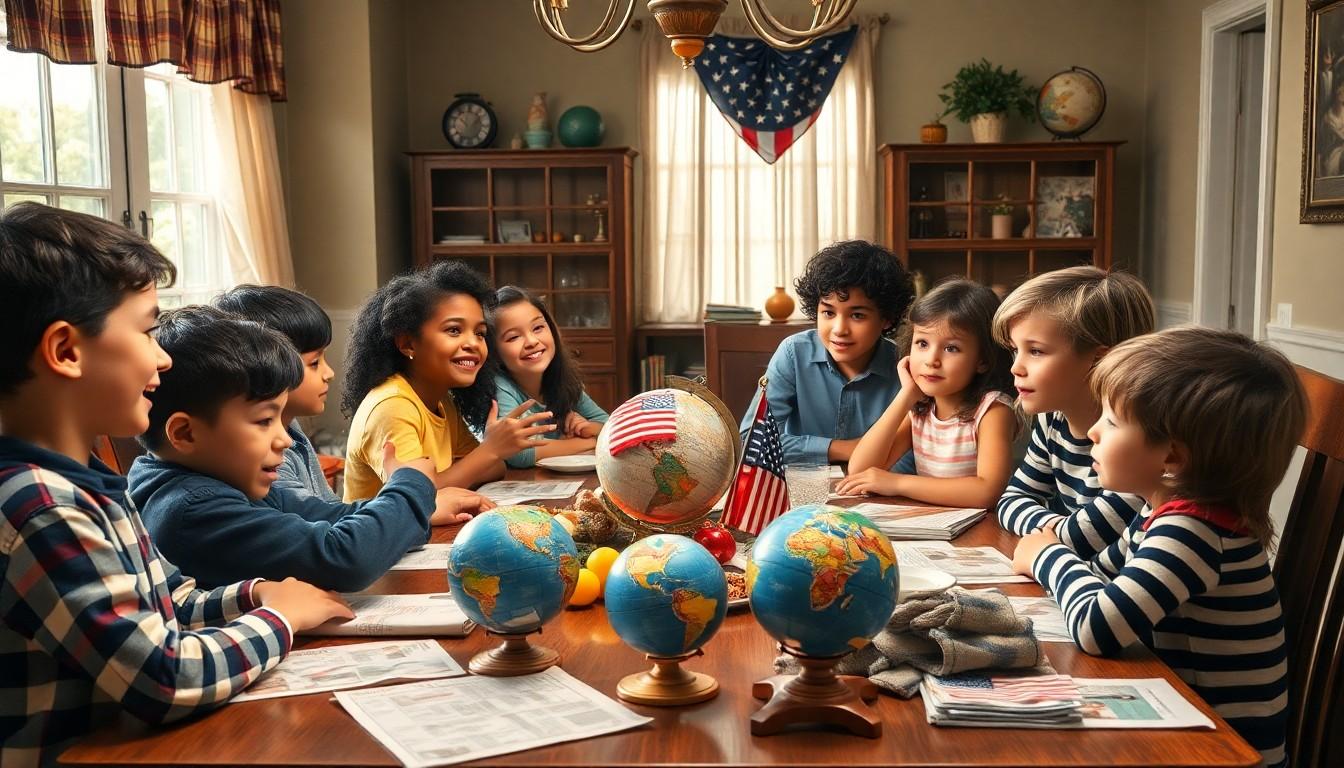The Best Fluffy Pancakes recipe you will fall in love with. Full of tips and tricks to help you make the best pancakes.

Political Socialization Example: How Your Family Shapes Your Political Views
Political socialization shapes how individuals form their beliefs and values about politics, often without them even realizing it. From family dinner debates to that one uncle who never misses a chance to share his opinions, these influences are everywhere. It’s like being marinated in a political sauce that flavors your worldview, and trust me, some sauces are spicier than others!
Understanding Political Socialization
Political socialization shapes how individuals form their political beliefs and values. This process involves various influences that contribute to one’s understanding of politics.
Definition and Importance
Political socialization describes the method individuals learn about political norms, values, and behaviors. It encompasses both conscious and unconscious influences that affect political perspectives. Understanding this process is crucial for recognizing how someone arrives at their political beliefs. Political socialization impacts voter behavior, civic engagement, and societal values, making it a foundational concept in political science. Developing awareness of this phenomenon allows scholars and citizens alike to better understand political dynamics in society.
Key Agents of Socialization
Key agents include family, schools, peer groups, and mass media. Families often serve as the first avenue of political exposure, delivering initial values and opinions. Schools provide structured civic education, promoting critical thinking about governance. Peer groups influence views through shared discussions and interactions, especially during formative years. Mass media shapes perceptions by framing political narratives, reaching broad audiences rapidly. Each agent plays a significant role in cultivating a person’s political identity and allegiance.
Political Socialization Examples

Political socialization occurs through various agents that shape individual beliefs and values. Understanding these examples reveals how deeply ingrained political perspectives develop.
Family Influence
Family stands as the first and most influential agent of political socialization. Discussions at the dinner table often introduce children to political ideas and values. Parents’ beliefs can become ingrained in their children’s understanding, affecting their political identities over time. Sharing political opinions can create a foundation for future discussions as children explore their own views. Additionally, family traditions and involvement in political activities can reinforce certain belief systems, making the family a critical point of reference throughout an individual’s life.
Educational Institutions
Schools significantly contribute to political socialization by providing foundational knowledge about civic responsibilities. Educational curricula often include lessons on government structure, history, and democratic principles. Teachers play a role by encouraging critical thinking and debate among students, shaping their political views. Programs that promote civic engagement help students understand their role within the political system, fostering future participation. Engaging with peers in this environment also allows students to exchange ideas, further influencing their political perspectives.
Media Impact
Media serves as a pivotal agent in shaping political beliefs and opinions. News outlets, social media platforms, and online forums expose individuals to a diverse array of political narratives. Coverage of current events informs citizens about important issues, impacting their viewpoints. Social media often amplifies specific messages and themes based on user interactions, creating echo chambers that reinforce existing beliefs. As a result, individuals often form opinions based on the information filtered through these media channels, highlighting the profound effect of media on political socialization.
Real-World Applications
Political socialization manifests in various contexts, influencing political beliefs and behaviors across different groups.
Case Studies in Political Socialization
One notable case study involves the influence of family during elections. In families with strong political ties, children often adopt similar political ideologies. Research highlights that children from Democratic households tend to lean more towards Democratic beliefs, while those from Republican backgrounds mostly align with Republican values. Educational settings provide another example. Schools frequently engage students in discussions about civic responsibility. Participation in class debates can shape students’ opinions and encourage active political involvement.
Comparative Analysis of Different Societies
International differences in political socialization reveal contrasting outcomes. In Western societies, emphasis on individualism often fuels personal political ideologies. Conversely, collectivist cultures, such as many in Asia, promote group consensus more strongly. Families and community leaders often guide political perspectives in these societies. The role of mass media differs as well. In societies with high media consumption, political narratives rapidly spread, influencing large audiences simultaneously. Understanding these differences highlights the complex nature of political beliefs shaped by cultural contexts.
Challenges and Changes in Political Socialization
Political socialization faces various challenges that reflect the evolving nature of society.
Impact of Technology
Technology significantly alters how individuals engage with political information. Social media platforms serve as primary channels for political discourse, shaping opinions in real-time. Algorithms curate personalized content that can create echo chambers, reinforcing existing beliefs. Additionally, younger generations increasingly rely on digital sources over traditional media, which can distort their understanding of diverse political viewpoints. The ease of accessing information leads to a mix of factual and misleading narratives, complicating informed citizenship. Online interactions often lack the depth found in face-to-face discussions, leaving critical questions around political engagement unanswered.
Shifting Political Landscapes
Shifting political landscapes continuously influence the process of political socialization. Contemporary divisions appear along ideological and partisan lines, affecting family dynamics and social interactions. Recent elections highlight rising polarization, where distinct values emerge within communities, often contradicting each other. The impact of global events, such as climate change, prompts new generations to advocate for progressive policies, challenging traditional beliefs. Local and national movements encourage civic participation, altering the way individuals view their role in democracy. New political identities emerge amid these changes, reshaping how individuals align with broader societal norms and values.
Conclusion
Political socialization is a complex and ongoing process that shapes individual beliefs and values. Its influence extends beyond childhood into adulthood, affecting how people engage with politics and society. As technology evolves and political landscapes shift, the ways in which individuals are socialized politically continue to change. Understanding these dynamics is essential for grasping how political identities are formed and how they influence civic participation. By recognizing the various agents of socialization, individuals can better navigate their own political beliefs and contribute meaningfully to democratic discourse.
